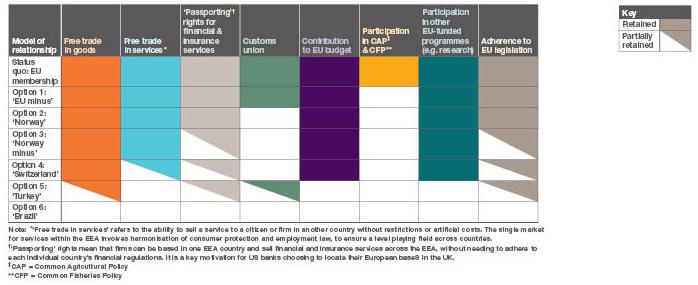One step removed? Six possible futures for the UK's economic relationship with the EU
Article
It seems likely that the government will soon seek to strike a deal with the EU that no longer allows free movement of people. In return, the EU is likely to require that the UK has less access to the single market.
At this point we cannot know precisely what trade-offs between migration policy and market access the UK will actually be able to make – they will depend on a process of diplomatic negotiation between the UK and the EU. However, progressive policymakers and thinkers need to work out which trade-offs they think would be better than others – and they need to do it soon. Only then can they work out what they think the UK’s approach to the negotiations should be.
To help policymakers and thinkers to do that, IPPR has produced two briefing papers. This briefing covers possible options for access to the single market; the other covers options for the UK’s migration policy.
These briefings are of course not unique – other organisations have published similar products. However, we hope these are somewhat broader in scope.
That is not to say that our two briefings are exhaustive, either – for both migration policy and single market access, there are almost infinite spectrums of options – but we have tried to set out what we think are the key options.
We assess the implications of each option against two objectives that policymakers may want to satisfy as they negotiate a deal with Europe:
- ensuring that the living standards of all UK citizens continue to rise
- ensuring that the UK ends up with a greater degree of self-determination.
‘Self-determination’ in this respect could mean either of two things: the ability to control our own trade policy (sign our own free trade agreements and set our own import tariffs); or to set our own laws where they relate to our tradeable activity, the main types being employment law, consumer protection, and environmental protection.
These two objectives are in tension with each other: retaining as much access to the single market as possible would minimise the negative effect on the UK economy of exit from the EU, but would require us to sign up to EU laws which we would have had no role in designing. We do not attempt in this paper to take a view on the option or options we should be pursuing. We have, however, set out IPPR’s initial views on the best options in a separate blog.
This report reviews the following six options for the UK's trading relationship with the EU and relationship with the single market, as well as first reviewing the status quo.
- ‘EU minus'
- ‘The Norway option'
- ‘Norway minus’
- ‘The Switzerland option’
- ‘The Turkey option’
- ‘The Brazil option’
Table A.1
Brexit: A summary of the economic options
Related items

The full-speed economy: Does running a hotter economy benefit workers?
How a slightly hotter economy might be able to boost future growth.
Making the most of it: Unitarisation, hyperlocal democratic renewal and community empowerment
Local government reorganisation need not result in a weakening of democracy at the local level.
Transport and growth: Reforming transport investment for place-based growth
The ability to deliver transformative public transport is not constrained by a lack of ideas, public support or local ambition. It is constrained by the way decisions are taken at the national level.
